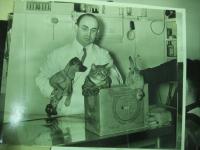The internet loves cute animals. Archivists do, too. So although there are many fabulous archival collections at the Philadelphia History Museum that I considered for the subject of this blog post, it seems almost inevitable that I settled on the Pennsylvania Society for the Prevention of Cruelty to Animals collection.
The Pennsylvania Society for the Prevention of Cruelty to Animals (PSPCA) was organized in 1867 by Philadelphia businessman Colonel M. Richards Mucklé, in response to violence he witnessed against animals, particularly overworked horses. The PSPCA was officially the first humane society in the state and only the second in the country! (The first is the American SPCA, which is not affiliated with the PSPCA.)
The Philadelphia History Museum holds a collection of Pennsylvania Society for the Prevention of Cruelty to Animals photographs, complaint books, and posters, starting in 1868 just after the organization's founding, and spanning almost a century to 1962. There are over three hundred photographs, nearly one hundred lantern slides, two complaint books, and approximately twenty posters. The collection documents animal neglect, SPCA facilities and operations, and public relations activities.
My favorite part of the collection is a series of photo contest entries. Philadelphians sent these adorable photos of their pets to the SPCA, presumably for fundraising or publicity use.


Left: Cat with doll in a chair, undated, #87.9.18. Submitted by Miss Florence Byrnes (South Philadelphia, Pa.). Right: "Now you won't take my picture," undated, #87.9.56. Submitted by Curtis Hager-Smith (North Philadelphia, Pa.)
Of course, the collection isn't all puppies and sunshine. There are many heartbreaking photographs depicting animals showing signs of abuse or neglect. Horses are the most frequently pictured in the collection, which is not surprising when you consider the PSPCA's origin story as a response to workhorse maltreatment. I should clarify that not all the horses shown are abused -- there are also images of well-kept horses, especially those who appeared in the PSPCA's Philadelphia Work-Horse Parade. After horses, the most common animals in the collection are dogs, followed by cats and chickens, and some other animals. In addition to these topics, there are photographs documenting SPCA facilities, such as clinics and offices.

PSPCA building and crowd, undated.
Aside from the photographs, the collection includes about 20 posters that range from educational (e.g. how to identify horse diseases), to promotional (garnering support for PSPCA), to documentary (depicting PSPCA actions).
The most important part of the collection from a research standpoint may be the two complaint books, which date from 1868 to 1872. The volumes log complaints submitted by citizens as well as reports of officers following up on the complaints. Many of the complaints relate to horse treatment, but I also noticed some entries regarding cockfighting, neglected cattle, and even a sheep.

Complaint 687, February 8th, 1871. "Complaint is made that Cock fights take place in the rear of 920 Walnut St., and that there is to be one to night between 10 & 12 o'clock. The Pit is in the Stable in the rear of 920 Walnut."
The PSPCA collection at the Philadelphia History Museum is a wonderful resource for studying the PSPCA organization in particular, but also the state of animal welfare in Philadelphia or urban environments more generally. (Philadelphia has a long and influential history in animal protection.) The stories the collection tells are filled with tragedy, but in many cases, ultimate salvation as well. And of course, there are lots of cute animals!

